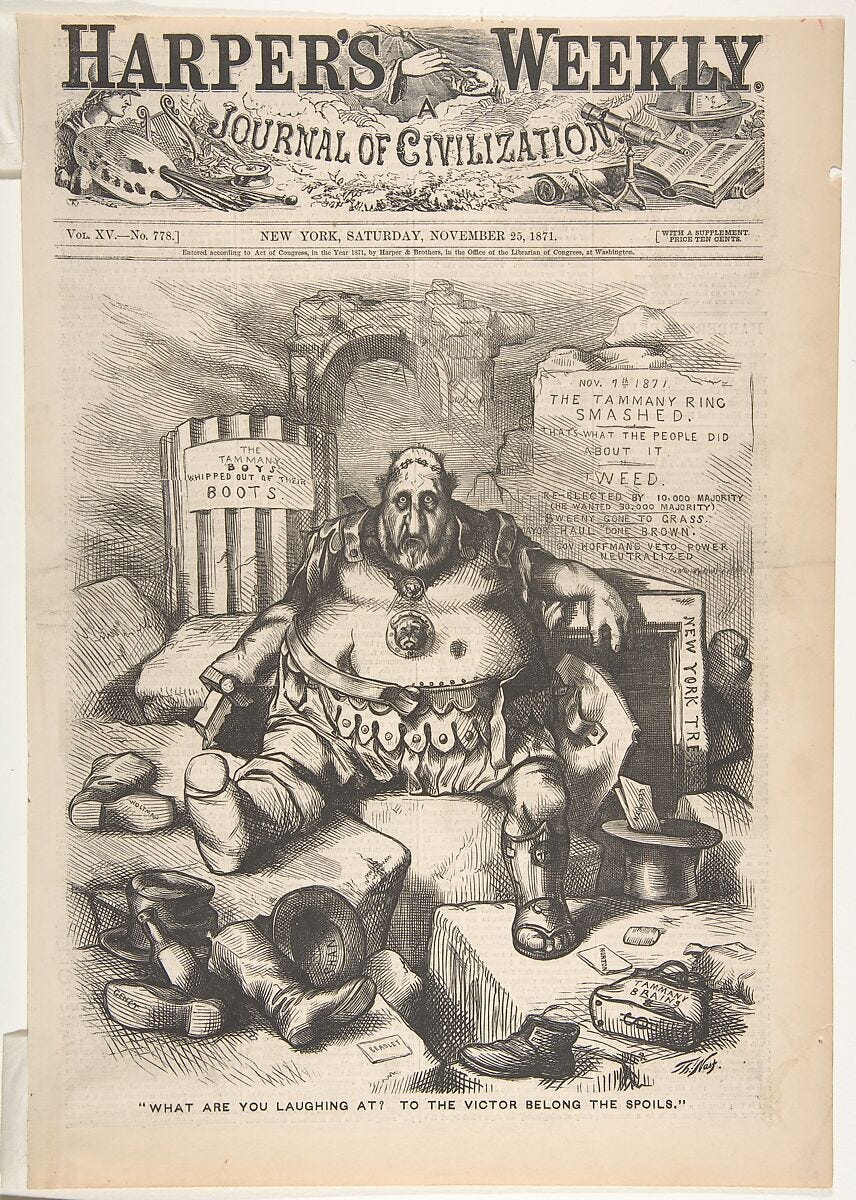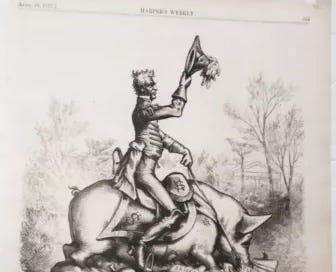What should we call the wholesale dismantling and rejiggering of the federal civil service by Elon Musk and his DOGE goons? A hostile takeover? A kindercoup? The AI-pocalypse?
Or is it a recrudescence of the spoils system — the web of cronyism and corruption in 19th-century American politics abetted by the seventh U.S. president, Andrew Jackson?
![In Memoriam - Our Civil Service as it Was - [Spoils System] - Thomas Nast - 1877 - Picture 1 of 4 In Memoriam - Our Civil Service as it Was - [Spoils System] - Thomas Nast - 1877 - Picture 1 of 4](https://substackcdn.com/image/fetch/$s_!xr5Y!,w_1456,c_limit,f_auto,q_auto:good,fl_progressive:steep/https%3A%2F%2Fsubstack-post-media.s3.amazonaws.com%2Fpublic%2Fimages%2F7db42ad5-3a57-43d3-8a12-4827c52c5e5e_336x500.webp)
My last suggestion is the choice of
, a professor of political science at the University of Michigan: “Trump and Musk are building a new spoils system . . . [in which] your access to public services depends on party affiliation,” he wrote on March 12. Daniel Feller, an emeritus professor of history at the University of Tennessee, says it’s the spoils system with extra spoilage: “Trump’s overhaul of the patronage is much more policy driven, or much more policy-grievance driven than Jackson’s was,” Feller told CNN on February 8. MSNBC’s Ali Veshi chimed in on March 8: “Trump’s gutting of the civil service has historic parallels to ‘Spoils System’.”Expect to see more spoils and spoils system in the coming weeks and months. And so — spoiler alert! — here’s some basic background. And stick around till the very end for your Moment of Branding Zen.
Blood and booty
Spoil has been a noun and a verb in English for 700 years; it’s related to the Old English verb spillan, “to destroy, to kill.” (Spillan also gave us spill, possibly from the connection to bloodshed.) Spoil was originally despoil: to plunder or to strip. The noun spoil or spoils, from the same source, has meant “booty” or “goods captured in time of war” since about 1300. (The Old French word espoille had the same meaning.) The poet John Dryden, in his 1697 translation of Virgil’s Georgics, was the first writer to use “the spoils of war” in English; since at least 1770 spoil or spoils could signify “emoluments of public office.”
But the phrase that led to spoils system was not a translation from Latin. It was home-grown in these United States.
After Andrew Jackson took office in March 1829, he personally removed “a significant number of federal bureau chiefs, marshals, attorneys and other officers and replaced them with party loyalists.” In January 1832 he nominated Martin Van Buren — who would go on to become the eighth U.S. president — to the post of minister to Britain, an appointment denounced by Senator Henry Clay “as nothing more than the same patronage practices that had been practiced for years in Van Buren’s home state of New York.” Rising on the U.S. Senate floor to defend the politicians of his home state, Senator William L. Marcy declared:
They boldly preach what they practice. When they are contending for victory, they avow their intention of enjoying the fruits of it. If they are defeated, they expect to retire from office :—If they are successful, they claim, as a matter of right, the advantage of success. They see nothing wrong in the rule, that to the victor belongs the spoils of the enemy.
(Emphasis added. The quote is often wrongly attributed to Jackson himself.)

Over the following decades the spoils system and civil service reform were hotly debated. It took the assassination in 1881 of the 20th president, James A. Garfield, by a deranged erstwhile office-seeker, Charles Guiteau, to finally force the issue. Garfield’s successor, Chester A. Arthur — until Garfield’s death a stalwart friend of the spoils system — signed the Pendleton Civil Service Act, which established the federal Civil Service Commission and made examinations, rather than party loyalty, the basis for hiring for many positions.1
Marcy may have been the first to coin “to the victor belong the spoils,” but the underlying concept of “might makes right” is as ancient as human avarice and hubris themselves. Thucydides, around 410 BCE, wrote that “the strong do what they can and the weak suffer what they must.” The Latin phrase vae victis — “woe to the conquered” — is attributed to Livy (d. 17 CE). The American abolitionist Adin Ballou lamented in 1846 that “‘Might makes right,’ and hoary folly totters on in her mad career escorted by armies and navies.”
It’s a short totter from there to “When the president does it, that means it’s not illegal” (Richard M. Nixon, 1977).
A few more notes on spoil
A spoiler is someone who spoils someone else’s chance at victory. It first appeared in the 1930s in sportswriting — a spoiler was “an inferior fighter who disrupts an opponent’s style” — and has been used since around 1957 in politics. See, e.g., Ralph Nader.
Spoiler has been used since the early 1980s to refer to information that reveals plot elements in a story. Spoiler alert was flagged in 2016 by writer/editor Lael Ewy as “a new term” necessitated by “[t]ime-shifting technologies such as DVRs and Netflix.”
Spoilsport (or spoil-sport) — “one who hinders enjoyment” — has been around since the 1780s.
Spoiled (or spoilt) for choice is an idiom meaning “having a lot of options.” Merriam-Webster says it’s “chiefly British”; back in 2015 Ben Yagoda noted its rise in American English.
Spoiling for (a fight, etc.) is an Americanism, dating back to about 1865, that means “longing long for” or “desiring earnestly.” Etymonline says the usage comes “from the notion that one will ‘spoil’ if he doesn't get it.”

Your Moment of Branding Zen: All hail this Victor!
Victor Laundry trucks used to be a common sight on the streets of Berkeley and Oakland. The company had an unbeatable slogan, “To the Victor go the soils,” that always made me grin. I don’t know when the company went out of business, but in the course of searching for an image of one of those trucks (which I still haven’t found), I discovered a 2011 interview published on Refinery29 that surprised me. It’s with Erica Tanov, whose eponymous clothing and accessories boutique on Berkeley’s Fourth Street I know quite well. It turns out Tanov’s grandfather owned Victor Laundry, and the boutique’s Fourth Street building once housed his business. “Ever since, it has remained in the family,” Tanov said.
In memoriam. For more on Garfield, a skilled, intelligent, and ethical man who I’m convinced would have been one of our greatest presidents if he’d survived, see Destiny of the Republic, by Candice Millard, and Assassination Vacation, by Sarah Vowell. And if you have a chance to see Stephen Sondheim’s brilliant Assassins on stage, seize it. Here’s “The Ballad of Guiteau” (“I Am Going to the Lordy”) from the 2004 Broadway revival of Assassins.




Recrudescence is a perfect term for these times! All is spoilt. Anew.
Writing from the eastern side of the pond, I'd never come across the term 'spoils system' before. I suspect this is a wholly American term.
But I am curious that you don't write about the 'spoiler' on cars, a device which improves their aerodynamic efficiency. Surely that's not just a British term?